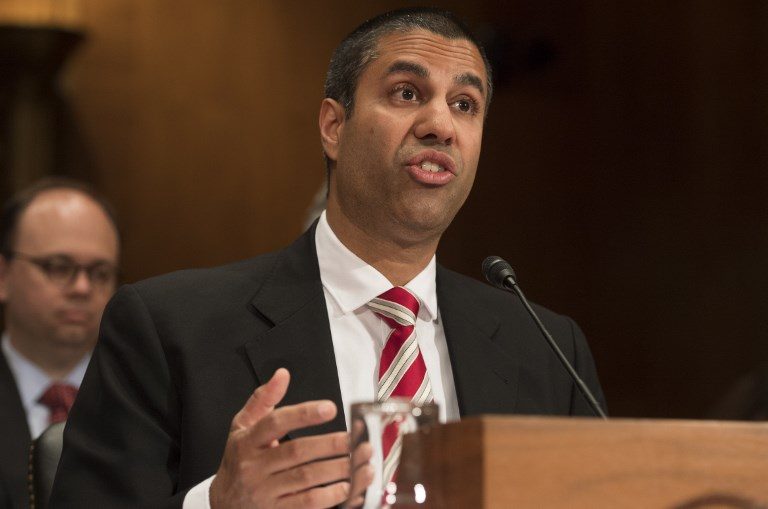SUMMARY
This is AI generated summarization, which may have errors. For context, always refer to the full article.

WASHINGTON DC, USA – The top US telecom regulator formally unveiled plans Tuesday, November 21, to roll back “net neutrality” rules adopted in 2015 aimed at treating all online traffic equally.
The announcement by Federal Communications chairman Ajit Pai marked the latest twist in a decade-old political dispute with both sides claiming to represent a “free and open” internet.
Pai unveiled a “Restoring Internet Freedom” order to be voted on at the FCC’s December 14 meeting, scrapping a hotly contest rule that barred broadband firms from shutting out rival services or creating online “fast” and “slow” lanes.
Pai said his plan would return to a “light-touch regulatory approach” that has allowed the internet to flourish.
He said the 2015 rule had “depressed investment in building and expanding broadband networks and deterred innovation.”
“Under my proposal, the federal government will stop micromanaging the internet,” Pai said in a statement.
The dispute over net neutrality has been the subject of several court battles, with backers arguing strong rules are needed to guard against powerful broadband firms like Comcast and AT&T acting as “gatekeepers” that can punish rivals.
Ferras Vinh of the Center for Democracy & Technology, a digital rights group, said the change threatens the online ecosystem.
“This is a direct assault on the fundamental digital rights of Americans,” Vinh said.
“In repealing these net neutrality protections, chairman Pai is providing internet service providers with an explicit license to block, slow or levy tolls on content, creating barriers to innovation and the spread of new ideas.”
Matt Wood of the consumer group Free Press said the new initiative was a “massive giveaway to the handful of media conglomerates” that control broadband.
“The most-hated and worst-rated companies will be free to block, throttle and discriminate against your speech on the internet if Trump’s FCC chairman gets his way,” Wood said.
Harold Feld of the consumer group Public Knowledge said the plan “puts broadband subscribers at the mercy of local cable companies whose ‘innovations’ have more to do with gouging consumers and crushing competition than with providing new services.”
‘Utility’ regulation
FCC officials said the new rules will retain consumer protection requiring internet providers to disclose any actions on blocking or throttling, and noted that any anticompetitive or discriminatory actions could be scrutinized by regulators.
Internet providers are barred from blocking “lawful content” under current laws, and that would not change, according to senior FCC officials.
They said the proposal would end “utility style” regulation adopted two years ago that was based on a 1934 law aimed at the telephone system.
Jonathan Spalter, chief executive of the industry association USTelecom, welcomed the move.
“The removal of antiquated, restrictive regulations will pave the way for broadband network investment, expansion and upgrades,” Spalter said in a statement.
Cinnamon Rogers of the Telecommunications Industry Association, said the new policy would return to an approach that “has encouraged private sector innovation and investment in broadband infrastructure, and the development of high-tech communications equipment that allows the internet to thrive.”
The move was criticized by Google, which said, “The FCC’s net neutrality rules are working well for consumers and we’re disappointed in the proposal announced today.”
Denelle Dixon of the online group Mozilla said the FCC plan “would only benefit internet service providers (ISPs). That’s why we’ve led the charge on net neutrality.”
Poking Obama
The FCC, which has 3 Republican and two Democratic members, was likely to pass the measure on a party-line vote.
Jessica Rosenworcel, a Democratic FCC member, said she would oppose the plan, as did fellow Democrat Mignon Clyburn.
“I’m going to give it all I’ve got. Our Internet economy is the envy of the world. It was built on a foundation of openness. We’re going to have to fight to keep it that way – for all of us,” Rosenworcel tweeted.
Roger Kay, an independent technology analyst and consultant, said the new policy appears to favor “old line telecom providers” that control broadband, at the expense of tech firms like Netflix and Google, and overturns a plan supported by former president Barack Obama.
“Why this particular set of alliances? The only unifying principle to any of these otherwise inexplicable policy decisions is ‘destroy anything Obama did,'” Kay said in a blog post.
“Obama and his friends were in favor of net neutrality? Then, we’re against it. He liked Silicon Valley? Let’s poke them in the eye.” – Rappler.com
Add a comment
How does this make you feel?
There are no comments yet. Add your comment to start the conversation.